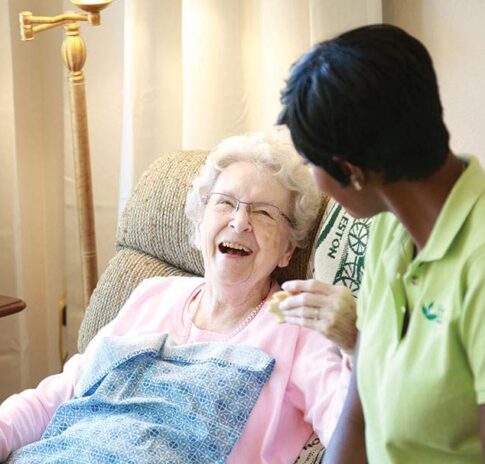Falling is an all too common problem with seniors that often lead to injuries and future health complications (due to a decline in bone mass throughout aging, falls can be the first step to decreasing health.) In fact, the majority of accidents that occur in retirement facilities are falls. The bright side is that falls can be easily prevented since they usually are caused by simple mistakes. In order to help avoid future health complications and maintain independence, our team of caregivers at FirstLight Home Care have developed some tips to prevent falls for seniors.
Keep a Well Lit Living Area
A well lit home is one of the easiest and most effective solutions to preventing falls. Make sure the home is bright enough to illuminate possible tripping hazards like electrical cords, throw rugs, and slippery, wet floors. Properly lit rooms will help eliminate falls that can be easily avoided and will create a safer environment to walk in.
Wear the Right Shoes
Another easy solution to preventing falls is wearing the right shoes. Avoid slippers or any shoes without good traction. Non-slip, sturdy shoes will help seniors maintain traction and balance in situations where they might fall. Also be sure to avoid shoes with thick soles since they can be more difficult to walk and balance in. By wearing thinner soled shoes, seniors will also be able to feel what is beneath them and better react to hazardous situations.
Remove Unnecessary Home Hazards
Homes are filled with tripping hazards. Even the most agile of people will find a way to trip on one thing or another throughout their homes. For seniors, this is all the more so. Make sure the home is cleared of any unnecessary tripping hazards, including wires and cords, throw rugs, and uneven floors.
Use Assistive Devices
There are tons of great assistive devices that can help aid seniors in their homes, including handrails, shower seats, and not-slip stairs. Each of these devices help improve a senior’s balance in situations where they might fall and help maintain their independence. Find areas throughout the home that are problematic and consider devices that will help maintain balance and prevent falls.
However, not all assistive devices are good. One item to avoid is bed guard rails. Guard rails do more harm than good since they can cause serious injury. In fact, most hospitals and retirement facilities prohibit restraints for this very reason. Instead, consider an electric bed and position it in its lowest horizontal position during times of rest to avoid further injuries if falls do occur. Electric beds are great for individuals that are in high-risk of falling because they can aid in entering and exiting the bed, as well as in maintaining a lower position while sleeping. You can also place a cushioned mat alongside the bed to soften the floor around them.
Stay Active
A healthy, active body is better equipped to avoid tripping hazards throughout the home as well as to recover from near-fall experiences. Seniors should keep an active lifestyle, at least walking each day to keep limber. Make sure to consult a doctor when beginning any form of exercise to ensure that the proper safety precautions are being used.
Rearrange sleeping quarters
The bedroom is a high-use room that often isn’t in the most ideal location in a home for a senior. If a senior’s bedroom is on the second floor of their home, consider moving it to the main floor. This will not only decrease the possibility of falling on stairs, but it will also limit the need for unnecessary travel throughout the house. This will also help maintain independence since they will not require as much aid before and after rest.
Consult a Physician About Medications
Some medications can cause dizziness, lack of vision, and weakness. Make sure to consult a doctor to know the risks that certain medications pose and to take the necessary precautions throughout the home to prevent falling. By discussing these factors with a doctor, seniors will be better prepared for preventing falls throughout their home.
